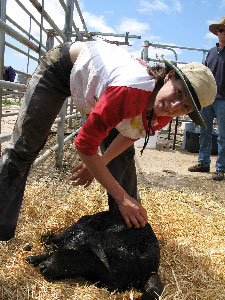Understanding pre-natal nutrition's effect on the expression of genetic potential in beef cattle
This article was originally published February 2010 on Page A7 in the Prairie Post's Bullbreeders 2010
Cattle need good nutrition all year round, but of course there are times when they need more and better quality feedstuffs. They must carry a calf to term, nurse it while taking care of themselves and re-breed. We can readily see the consequences of poor maternal nutrition on cow condition, conception rates, calf growth and performance. However, there may be hidden effects of maternal nutrition, which we are not aware of, programmed into the calf even before it is born. Probing further into these effects is the area of research being initiated by Dr. Carolyn Fitzsimmons, an AAFC Research Scientist working at the University of Alberta.
Maternal nutrition during pregnancy has been investigated in human medicine over many decades and, currently, the long-term effects of pre-natal nutrition are a hot topic. Studies on children born during or after famines, for example, the Dutch ‘Hunger Winter' of 1944-45, have shown that under-nutrition, particularly during the first trimester of pregnancy, can alter body composition and metabolism of these individuals permanently so that they express a “thrifty“ phenotype. They appear to accumulate fat and its related health consequences much easier than their siblings who were not born during the famine. In these extreme examples, the responses must also be in the extreme. But what happens during more normal physiological conditions? How much of an animal's physiology after birth can be affected by what its mother eats? And can we improve post-natal performance by optimizing pre-natal nutrition?
The genetics of a calf is relatively fixed as soon as sperm meets egg, but research has found that the way the DNA is packaged and modified can affect the expression of its genes. Modifications to DNA, for example, the addition of the amino acid methionine onto the cytosine (C) residue of DNA (the "C" in "AGTC"), can be affected by the environment, and either increase or decrease the expression of the genes that are close by. Therefore, two calves with the same genetic background may express their genes differently, and this pattern may be set much before birth due to the nutrients a calf receives from its mother during gestation.
Studies performed in pigs and sheep have shown interesting effects of moderate changes in pre-natal nutrition on muscle fiber number, type and distribution, and in immunological response, capillary density and gene expression. Therefore, it appears that the potential to modify specific, economically important, physical characteristics is possible in livestock species. Ensuring or even enhancing the genetic potential of cattle via pre-natal nutrition may further improve the precision of genetic selection and reduce the animal-to-animal variability that is inherent in raising cattle. The results of Dr. Fitzsimmons' research will contribute to a better understanding of how pre-natal nutrition can affect future overall performance and will help improve beef productivity in Canada.

Research conducted at:
Agriculture and Agri-Food Canada, Lacombe Research Centre
University of Alberta, Edmonton
